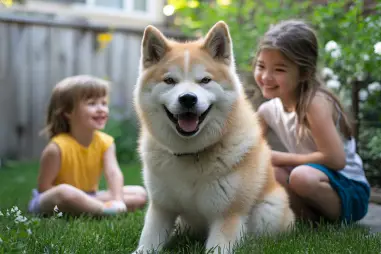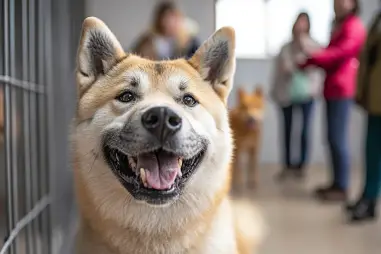Akitas are a majestic and powerful breed, renowned not only for their striking appearance but also for their distinctive behavior and temperament. As an owner or prospective Akita parent, understanding what makes these dogs tick is crucial to fostering a strong, positive relationship. Known for their loyalty, independence, and sometimes stubborn nature, Akitas can be wonderful companions when given the right guidance and environment. Let’s delve deeper into the nuances of Akita dog behavior and temperament to help you inside the mind of your Akita.
General Temperament Traits
Akitas possess a noble and dignified temperament that sets them apart from many other breeds. They tend to be courageous, confident, and composed, often carrying themselves with an air of quiet self-assurance. One key trait is their strong-willed nature—they are known for being independent thinkers who sometimes prefer to make their own decisions rather than blindly follow commands.
Despite their independence, Akitas are deeply loyal and protective of their families. This combination of traits means that while they may not always be the most eager to please dog, their commitment to their loved ones is unwavering. Akitas often form lifelong bonds with their owners and can be gentle and affectionate within the family home, showing a softer side beneath their strong exterior.
However, their alertness and natural guarding instincts mean Akitas can be wary of unfamiliar people or other animals. They require an owner who understands the balance between respecting their independence and guiding their behavior with consistent, positive training methods.
How Akitas Interact with Family and Strangers
Within the family environment, Akitas tend to be calm and loving. They often view their family members with a deep sense of loyalty and affection, often acting protective and sometimes even watchful over those they consider part of their inner circle. Many Akitas enjoy participating in family activities and can develop close bonds with children, especially when raised together from a young age.
When it comes to strangers, Akitas usually adopt a reserved and cautious stance. They may observe newcomers quietly, assessing potential threats or changes to their environment. This natural suspicion makes Akitas excellent guard dogs but can also pose challenges if owners do not properly socialize and train them to cope with new situations.
It’s important to note that while some Akitas may warm up quickly to visitors once given appropriate introductions, others maintain a more distant and aloof demeanor toward strangers. This behavior is rooted in their instinctive protective nature and should always be managed thoughtfully to prevent undue aggression or fearfulness.
The Impact of Socialization on Akita Behavior
Socialization plays a vital role in shaping an Akita’s temperament. Early and ongoing social exposure helps these dogs learn to differentiate between normal, non-threatening situations and those that may require heightened alertness. Without sufficient socialization, Akitas may develop anxiety, fearfulness, or aggressive tendencies toward unfamiliar people and animals.
To foster a well-adjusted Akita, it’s recommended that owners introduce their puppies to a variety of environments, people, and other dogs from an early age. Positive experiences during this critical period teach Akitas that new interactions can be safe and enjoyable. However, it’s crucial to approach socialization gradually and with patience, respecting the puppy’s comfort level while gently encouraging exploration.
Continued socialization throughout an Akita’s life supports their mental health and helps prevent behavioral issues that often arise from boredom or fear. Enrolling your dog in obedience classes, attending dog-friendly events, and regularly exposing them to new sights, sounds, and smells can greatly improve their social skills and confidence.
Managing Akita Independence
Akitas are famously independent and sometimes stubborn, traits that can pose a challenge for owners expecting a highly obedient or “eager-to-please” dog. Understanding how to manage this independence is key to successful training and a happy home life.
One of the best ways to engage an Akita’s independent mind is through consistent, positive reinforcement training. Harsh methods or inconsistent discipline often backfire with these self-reliant dogs, who may simply decide to ignore commands rather than respond to punishment.
Building a training routine that rewards cooperation and gently encourages repeated good behavior helps Akitas bloom into obedient yet confident companions. Establishing yourself as a consistent and fair leader without relying on dominance creates mutual respect and strengthens your bond.
In addition, respecting an Akita’s need for alone time and recognizing their independent streak can prevent frustration on both sides. Giving your dog opportunities to make safe choices—such as having control over simple actions or engaging in supervised off-leash time—can satisfy their desire for autonomy.
Recognizing Signs of Stress or Aggression
Like all dogs, Akitas can experience stress or discomfort, which may sometimes manifest as aggression if left unaddressed. It’s important for owners to recognize early warning signs to intervene and manage these behaviors promptly.
Common signs of stress in Akitas include:
- Yawning excessively or lip licking
- Avoiding eye contact
- Pacing or restlessness
- Growling or snapping
- Raised hackles or stiff body posture
- Excessive barking or lunging
If your Akita displays these signs, it’s often a cue to remove them from the stressful situation or to address the underlying cause, whether it’s fear, pain, or overstimulation.
Aggressive behavior in Akitas can sometimes stem from fear or protective instincts. Early socialization, regular training, and positive behavioral reinforcement can reduce the likelihood of serious aggression. Consulting a professional trainer or behaviorist with experience in Akitas is recommended if aggression becomes a significant concern.
Behavioral Enrichment and Mental Stimulation
Given their intelligence and independent nature, Akitas thrive when given mental challenges and opportunities for enrichment. Boredom can lead to destructive behavior or increased anxiety, so providing plenty of stimulating activities is critical.
Engage your Akita with puzzle toys, interactive games, scent work, or obedience challenges that tap into their curious minds. Activities like hide-and-seek or learning new tricks also provide mental exercise and strengthen your relationship.
Additionally, regular physical exercise is just as important in keeping an Akita balanced. They are an active breed and benefit greatly from daily walks, runs, or play sessions in a secure area to expend energy healthily.
Tips for Cultivating a Balanced Akita Personality
Building a well-rounded and harmonious Akita personality involves a blend of understanding, patience, and proactive care. Here are some practical tips:
- Start early: Begin socialization and training as soon as you bring your Akita home.
- Be consistent: Establish clear rules and reinforce them kindly but firmly.
- Respect independence: Allow your Akita safe opportunities for decision-making and alone time.
- Provide mental and physical exercise: Keep their minds and bodies engaged daily.
- Watch for stress signals: Learn to read their body language to intervene early if needed.
- Seek professional guidance: Don’t hesitate to enlist help from trainers or behaviorists experienced with the breed.
By embracing the unique qualities of the Akita and providing the structure and love they thrive on, you can nurture a balanced and deeply rewarding relationship with this remarkable breed.
Understanding Akita dog behavior and temperament opens the door to a strong, trusting bond between you and your dog. While these majestic companions may sometimes challenge your patience with their independence, their loyalty and affection are unmatched. With thoughtful socialization, respectful management of their temperament, and enriching activities, your Akita can be a steadfast friend and protector for many years to come.







